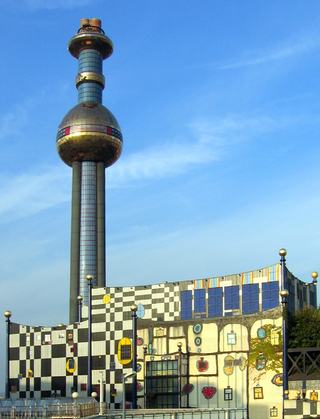
Incineration is a waste treatment process that involves the combustion of substances contained in waste materials. Industrial plants for waste incineration are commonly referred to as waste-to-energy facilities. Incineration and other high-temperature waste treatment systems are described as "thermal treatment". Incineration of waste materials converts the waste into ash, flue gas and heat. The ash is mostly formed by the inorganic constituents of the waste and may take the form of solid lumps or particulates carried by the flue gas. The flue gases must be cleaned of gaseous and particulate pollutants before they are dispersed into the atmosphere. In some cases, the heat that is generated by incineration can be used to generate electric power.

Landfill gas is a mix of different gases created by the action of microorganisms within a landfill as they decompose organic waste, including for example, food waste and paper waste. Landfill gas is approximately forty to sixty percent methane, with the remainder being mostly carbon dioxide. Trace amounts of other volatile organic compounds (VOCs) comprise the remainder (<1%). These trace gases include a large array of species, mainly simple hydrocarbons.
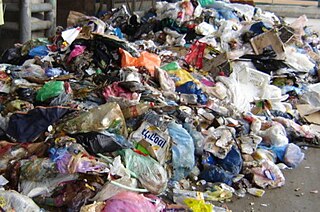
Municipal solid waste (MSW), commonly known as trash or garbage in the United States and rubbish in Britain, is a waste type consisting of everyday items that are discarded by the public. "Garbage" can also refer specifically to food waste, as in a garbage disposal; the two are sometimes collected separately. In the European Union, the semantic definition is 'mixed municipal waste,' given waste code 20 03 01 in the European Waste Catalog. Although the waste may originate from a number of sources that has nothing to do with a municipality, the traditional role of municipalities in collecting and managing these kinds of waste have produced the particular etymology 'municipal.'
A mechanical biological treatment (MBT) system is a type of waste processing facility that combines a sorting facility with a form of biological treatment such as composting or anaerobic digestion. MBT plants are designed to process mixed household waste as well as commercial and industrial wastes.
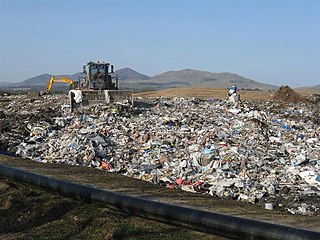
Landfills in the United Kingdom were historically the most commonly used option for waste disposal. Up until the 1980s, policies of successive governments had endorsed the "dilute and disperse" approach. Britain has since adopted the appropriate European legislation and landfill sites are generally operated as full containment facilities. However, many dilute and disperse sites remain throughout Britain.

The Landfill Directive, more formally Council Directive 1999/31/EC of 26 April 1999, is a European Union directive which regulates waste management of landfills in the European Union. It was to be implemented by EU Member States by 16 July 2001. Directive (EU) 2018/850 amended the 1999 directive with effect from 5 July 2020.

Green waste, also known as "biological waste", is any organic waste that can be composted. It is most usually composed of refuse from gardens such as grass clippings or leaves, and domestic or industrial kitchen wastes. Green waste does not include things such as dried leaves, pine straw, or hay. Such materials are rich in carbon and considered "brown wastes," while green wastes contain high concentrations of nitrogen. Green waste can be used to increase the efficiency of many composting operations and can be added to soil to sustain local nutrient cycling.

Biodegradable waste includes any organic matter in waste which can be broken down into carbon dioxide, water, methane, compost, humus, and simple organic molecules by micro-organisms and other living things by composting, aerobic digestion, anaerobic digestion or similar processes. It mainly includes kitchen waste, ash, soil, dung and other plant matter. In waste management, it also includes some inorganic materials which can be decomposed by bacteria. Such materials include gypsum and its products such as plasterboard and other simple sulfates which can be decomposed by sulfate reducing bacteria to yield hydrogen sulfide in anaerobic land-fill conditions.

Biodegradable plastics are plastics that can be decomposed by the action of living organisms, usually microbes, into water, carbon dioxide, and biomass. Biodegradable plastics are commonly produced with renewable raw materials, micro-organisms, petrochemicals, or combinations of all three.
The Landfill Allowance Trading Scheme, LATS, is an initiative by the UK government, through DEFRA to help reduce the amount of biodegradable municipal waste (BMW) sent to landfill.

WRAP is a British registered charity. It works with businesses, individuals and communities to achieve a circular economy, by helping them reduce waste, develop sustainable products and use resources in an efficient way.
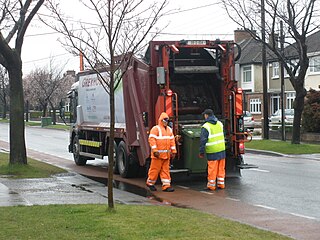
A green bin is a large, movable, rigid plastic or metal container that contains biodegradable waste or compostable materials as a means to divert waste from landfills. In some local authorities, green bins are also used to contain unsorted municipal solid waste.

Food loss and waste is food that is not eaten. The causes of food waste or loss are numerous and occur throughout the food system, during production, processing, distribution, retail and food service sales, and consumption. Overall, about one-third of the world's food is thrown away. A similar amount is lost on top of that by feeding human-edible food to farm animals. A 2021 meta-analysis, that did not include food lost during production, by the United Nations Environment Programme found that food waste was a challenge in all countries at all levels of economic development. The analysis estimated that global food waste was 931 million tonnes of food waste across three sectors: 61 percent from households, 26 percent from food service and 13 percent from retail.

In 2015, 43.5% of the United Kingdom's municipal waste was recycled, composted or broken down by anaerobic digestion. The majority of recycling undertaken in the United Kingdom is done by statutory authorities, although commercial and industrial waste is chiefly processed by private companies. Local Authorities are responsible for the collection of municipal waste and operate contracts which are usually kerbside collection schemes. The Household Waste Recycling Act 2003 required local authorities in England to provide every household with a separate collection of at least two types of recyclable materials by 2010. Recycling policy is devolved to the administrations of Scotland, Northern Ireland and Wales who set their own targets, but all statistics are reported to Eurostat.
The National Waste Strategy is a policy of the Parliament of the United Kingdom as well as the devolved administrations in Scotland, Wales and Northern Ireland. The development of national waste strategies is intended to foster a move to sustainability in waste management within the United Kingdom.

Food waste in the United Kingdom is a subject of environmental, and socioeconomic concern that has received widespread media coverage and been met with varying responses from government. Since 1915, food waste has been identified as a considerable problem and has been the subject of ongoing media attention, intensifying with the launch of the "Love Food, Hate Waste" campaign in 2007. Food waste has been discussed in newspaper articles, news reports and television programmes, which have increased awareness of it as a public issue. To tackle waste issues, encompassing food waste, the government-funded "Waste & Resources Action Programme" (WRAP) was created in 2000.
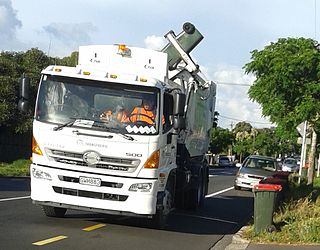
The management of waste in New Zealand has become more regulated to reduce associated environmental issues. According to OECD data, New Zealand is the third most wasteful country in the OECD.
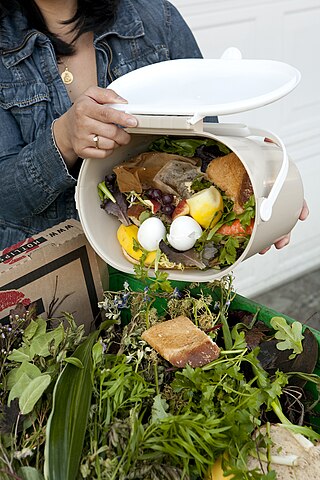
Source-separated organics (SSO) is the system by which waste generators segregate compostable materials from other waste streams at the source for separate collection.

It is estimated that 290 million tonnes of waste was produced in the United Kingdom in 2008 but volumes are declining. In 2012 municipal solid waste generation was almost 30 million tonnes, according to Waste Atlas Platform.















